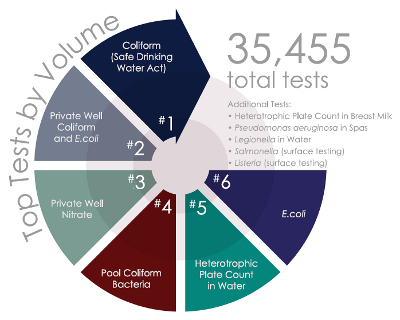Environmental Microbiology
Environmental Microbiology provides analytical services to detect foodborne and waterborne illnesses and assess the quality of drinking water and recreational waters. The analyses are used to help pinpoint the source of outbreaks, to determine if water is safe to drink or swim in, and to assess the environmental impact from exposure to microbial contaminants.
Karen Owens, environmental laboratory
analyst, prepares beef trim submitted from
a meat-processing facility for the testing
of E.coli O157:H7 as required by the Iowa
Department of Agriculture.

FY13 achievements:
- In the summer of 2012, the Hygienic Laboratory confirmed Salmonella Blockley (a disease-producing organism) in 22 patients from the Des Moines area. About 80 percent of those patients reported visiting the same restaurant. Extensive sample testing by Environmental Microbiology from that restaurant included 24 surface samples (cutting board, prep table, slicer, cooler door and handle, and others), 11 food samples, and three water and ice samples.
- Environmental Microbiology tested 66 groundwater sources that supply public drinking water in the state that were part of a Virus in Groundwater study with Iowa partners. Testing of raw groundwater produced by individual wells gives an indication of the long-term quality of the incoming groundwater source, provides an early warning of future water quality and public health concerns, and allows water suppliers information to efficiently plan for mitigation. The samples were tested for E.coli, total coliforms, enterococci and male-specific and somatic coliphages (DNA viruses that effect host cells of E.coli).
- Environmental Microbiology and Limnology participated in an Environmental Protection Agency project to measure the rate of die-off and degradation of fecal indicator bacteria in the Mississippi River. Samples were collected from a sewage treatment plant at the point of discharge into the Mississippi River and several points downstream. Collections were made at two-hour intervals during the daytime for one week. Analysis was conducted throughout that week to accommodate the short holding time for approximately 200 samples in the large project. Microbiologists performed analyses for enterococci, E.coli and qPCR filter preparation.
- Environmental Microbiology tested 282 samples for Salmonella and 212 for Listeria from three food-processing plants in Iowa as part of an Iowa Department of Inspections and Appeals project to help establish and promote a foodborne outbreak surveillance system. The project, which continues into fiscal year 2014, verified lab logistics and capacity for testing the high volume of specimens.